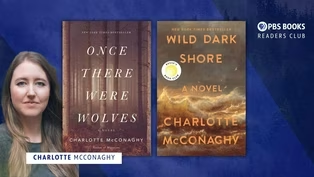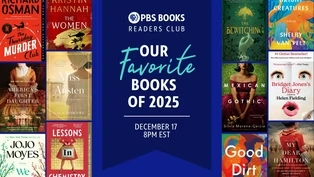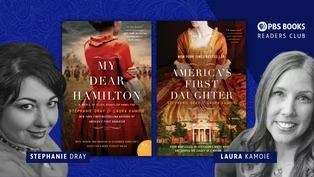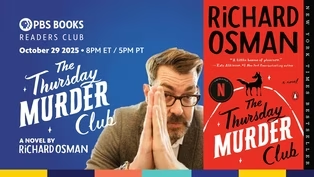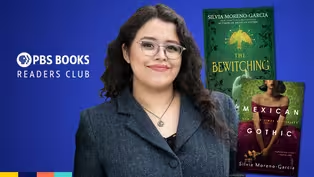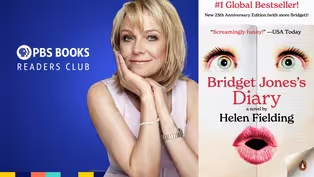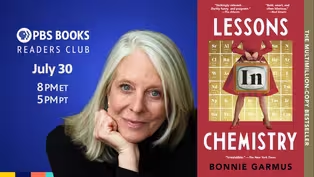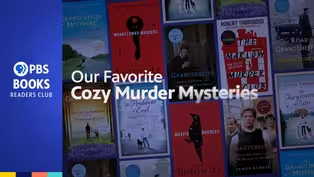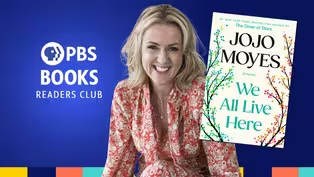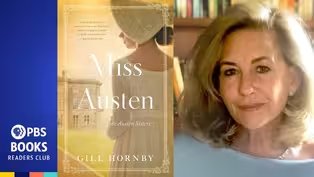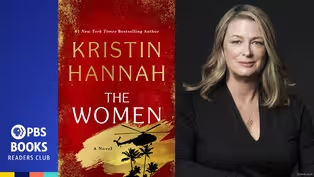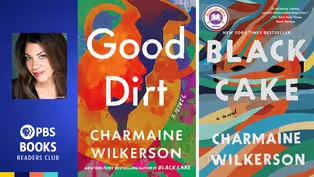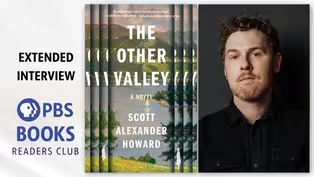
Readers Club | Scott Alexander Howard
Season 2024 Episode 28 | 44m 15sVideo has Closed Captions
The PBS Books Readers Club sits down with the author of "The Other Valley", Scott Alexander Howard.
The Other Valley is Howard’s debut novel. A Goodreads “Most Anticipated Fantasy, Science Fiction, and Horror Book of 2024”, it’s an elegant and exhilarating literary speculative novel about an isolated town neighbored by its own past and future. This thrilling page-turner will make readers ask the question: would you want to know your future if you could? And what would you risk to change it?
Problems playing video? | Closed Captioning Feedback
Problems playing video? | Closed Captioning Feedback

Readers Club | Scott Alexander Howard
Season 2024 Episode 28 | 44m 15sVideo has Closed Captions
The Other Valley is Howard’s debut novel. A Goodreads “Most Anticipated Fantasy, Science Fiction, and Horror Book of 2024”, it’s an elegant and exhilarating literary speculative novel about an isolated town neighbored by its own past and future. This thrilling page-turner will make readers ask the question: would you want to know your future if you could? And what would you risk to change it?
Problems playing video? | Closed Captioning Feedback
How to Watch PBS Books
PBS Books is available to stream on pbs.org and the free PBS App, available on iPhone, Apple TV, Android TV, Android smartphones, Amazon Fire TV, Amazon Fire Tablet, Roku, Samsung Smart TV, and Vizio.
Providing Support for PBS.org
Learn Moreabout PBS online sponsorshipMore from This Collection
The PBS Books Readers Club is a monthly digital-first series that brings its members into conversations behind the stories of your favorite books & shows. You can watch the online on the PBS App, with extended interviews available for PBS members on PBS Passport.
Readers Club | Ep 301: Charlotte McConaghy | Once There Were Wolves
Video has Closed Captions
PBS Books Readers Club hosts author Charlotte McConaghy to discuss her novel Once There Were Wolves. (58m 55s)
Readers Club | Ep. 212: Our Favorite Books of 2025
Video has Closed Captions
PBS Books Readers Club celebrates the wrap of its second season with a highlight of 2025 (47m 55s)
Readers Club | Ep. 211: America's First Daughter | Stephanie Dray & Laura Kamoie
Video has Closed Captions
PBS Books Readers Club welcomes co-authors Stephanie Dray and Laura Kamoie (1h 1m 45s)
Wed Oct 29 2025 | Readers Club | Ep. 210: Richard Osman | Thursday Murder Club
Video has Closed Captions
PBS Books Readers Club welcomes celebrity writer Richard Osman to discuss his best-selling novel (52m 44s)
Readers Club | Ep. 209: Silvia Moreno-Garcia | The Bewitching and Mexican Gothic
Video has Closed Captions
PBS Books Readers Club welcomes award winning author Silvia Moreno-Garcia to discuss her new book. (52m 42s)
Readers Club | Ep. 208: Helen Fielding | Bridget Jones's Diary
Video has Closed Captions
PBS Books Readers Club welcomes beloved British author Helen Fielding to discuss her iconic novel (59m 30s)
Readers Club | Ep. 207: Lessons in Chemistry | Bonnie Garmus
Video has Closed Captions
PBS Books Readers Club welcomes international best-selling author Bonnie Garmus to discuss her novel (49m 3s)
Readers Club | Ep. 206: Our Favorite Cozy Murder Mysteries
Video has Closed Captions
PBS Books Readers Club hosts a special event sharing Our Favorite Cozy Murder Mysteries (52m 32s)
Readers Club | Ep. 205: We All Live Here | Jojo Moyes
Video has Closed Captions
PBS Books Readers Club welcomes international & New York Times best-selling author Jojo Moyes (57m 37s)
Readers Club | Ep. 204: Miss Austen | Gill Hornby
Video has Closed Captions
PBS Books Readers Club welcomes international best-selling author Gill Hornby to discuss her novel (51m 18s)
Readers Club | Ep. 203: The Women by Kristin Hannah
Video has Closed Captions
PBS Books Readers Club welcomes international best-selling author, Kristin Hannah to discuss novel. (53m 29s)
PBS Books Readers Club | Ep. 202: Good Dirt & Black Cake | Charmaine Wilkerson
Video has Closed Captions
PBS Books Readers Club is delighted to welcome critically acclaimed author Charmaine Wilkerson (55m 29s)
Providing Support for PBS.org
Learn Moreabout PBS online sponsorship(graceful orchestral music) - I wasn't telling everybody, "Hey, I'm writing a book," 'cause I didn't wanna jinx it or, you know, just brag about this thing that might not actually happen.
And so I had this one friend who knew I was doing it, and he said like, "You have to give me some kind of indication of what it's about," 'cause I wouldn't tell him.
And finally I said, "What if it was like, if Tarkovsky directed 'Back to the Future'?"
And he was like, "Oh, I can work with that."
(graceful orchestral music continues) - Well, hi, and welcome to the "PBS Books Readers Club."
- Today, we'll be joined by Scott Alexander Howard, Author of this month's Pick "The Other Valley."
- The New York Times calls this book a slow boiling, philosophical thriller, covering concepts like grief, love, and fate versus free will.
And that's so true.
- If you haven't read it yet, don't worry, there are no spoilers.
- True.
- And this conversation will just enhance your reading experience.
- Hi, I'm Fred Nahhat here with Lauren Smith, Heather-Marie Montilla is our resident librarian, national director of PBS Books, and award-winning video essayist Princess Weekes brings her master's degree in Literary Theory to our table to help us make sense of all of this.
- And, boy, do I try.
- We're really glad to have you.
- With this one, I really felt like I needed to use all of that education.
- We are grateful.
- But, of course, you are the most important member of this book club.
So please share all your thoughts in the comments.
We hope you'll join the PBS Books Readers Club Facebook group to find and share book recommendations and discuss your favorite reads.
And speaking of favorite reads, I really enjoyed "The Other Valley."
It was one of those page-turners, a thriller for sure, but not in, like, a spooky, horror way.
Just like, "I wanna know what happens next."
What did you think?
- Absolutely.
I mean, it's really rich.
It's about this teenage girl named Odile.
She lives in this small town with these heavily guarded borders between these two villages where you can go 20 years into the past or 20 years into the future.
And she gets a possibility to be one of the people who helps decide who gets to go one way or the other.
And it's just such a interesting dilemma of what you would do with that kind of power.
But also does it behoove you really to know that much about the past or the future?
- Yeah, I really love the book too.
For me, it was a lot about interfamilial relationships.
It was about a mother and child and expectations.
It was about really parents' choices and rules they lay out and how that rule or those situations can impact so very much.
And everyone around them, too, and just how it snowballs and affects others in their realm.
- Yeah.
- Fascinating.
And those clever writers at The Times, a philosophical thriller, I love that.
That's exactly what it is.
And you're talking about dystopia.
Say one thing for dystopia.
It really puts some framing around what's actually important in the sense of human joy.
it was really great.
- I thought it was really interesting, too, like just the idea of living in such a controlled society, these borders between the future and the past were very heavily guarded.
And it's interesting to think about, like, what are those controls in our world?
- Right.
- You know?
What is making us act the way that we do?
And I also thought it was interesting, like, there was very specific reasons why you would be allowed to cross into the future or into the past.
And one of those reasons was grief.
In order to, like, see someone that you've lost or to find out what's gonna happen to your family if you know, for some reason, you're not gonna make it, you know, 20 years in the future.
Like, for that to be the only reason why you could cross into the future, it just made it so interesting, like these ideas of grief.
And of course it makes you ask like, if given the choice, would you cross into the future?
Would you cross into the past?
Would you wanna know?
- Yeah.
No, I feel like I'm nosy, I wanna know.
I feel like I would love to get advice from my future self, you know, or like words of comfort 'cause I feel like there's so much anxiety, especially now, about the future.
I don't know if my past self would take my advice.
- Or it wants to go back.
- Let's just move forward.
Like, I love my present and I love where I've gotten to, but I think I would be tempted to see where I would go.
- You know, I also thought, as I was reading this, about memory and who are the people in my past who maybe have passed away who I would wanna visit and just observe and see them one last time?
And that isn't really something I have really ever considered before as an adult at least.
So that was, you know, really deep as I was reading.
I definitely think this book, you wrestle with questions of memory, questions of the future, what your future holds, and that makes it fun but also challenging.
- Yeah, I think I would just ruin it for myself either way.
Like, if I tried to go to the future and find out what was gonna happen, then my present self would try to fix it and probably make it worse.
And if I went to the past and try to give myself advice, I think I would ruin it.
I'd make it worse.
- Well, that sounds- - I'm gonna stay put.
- That sounds right.
I'm holding.
I wouldn't wanna know.
I love my life.
I'm playing with the house money.
I wanna see that game play out in real time and figure out what the final score is.
Well, lots to discuss with Scott Alexander Howard.
He'll be joining us in just a moment.
But first, we wanna invite you to join the PBS Books Readers Club Facebook group.
- [Lauren] And be sure to follow PBS Books on Facebook, and Instagram too, so you can fill your feed with great books and authors.
- And if you find yourself really appreciating this program, I hope you'll take a moment right now to show your support.
PBS stations rely on donations from folks like you and me.
And if you'd like to see more of the PBS Books Readers Club, please consider making a donation to help keep the whole thing going.
- [Lauren] Yeah, do that right now.
Visit pbsbooks.org/donate.
You'll be taken to your local PBS station's giving webpage where you can find some awesome PBS Books swag as our thanks for supporting this program.
One of those gifts is an eBook download of "The Other Valley" or any of our PBS Books features for your phone, tablet, or eReader.
After you make your donation, you'll receive an email with a link and a special code to download one of our featured books.
Plus, we'll send you a set of the official PBS Books Readers Club stickers.
- Ah, those stickers are a really fun way to show off your love of reading and your support for PBS.
They're heavy-duty removable stickers that you can put on your phone, your laptop, water bottle, car, truck, wherever you like- - Notebook.
- Get yours when you visit pbsbooks.org/donate.
- Donations support your local PBS station.
And they let us know that you like to see more of the PBS Books Readers Club.
Plus, as a PBS member, you'll also enjoy access to PBS Passport, the members only section on the PBS app where you can stream full seasons of your favorite PBS shows, including our watch-a-like for this month, "A Brief History of the Future."
It's a really interesting documentary series about our futures and how we might re-imagine them.
If you loved reading "The Other Valley," I think this show will be right up your alley.
- Well, it's now time to bring in the author of today's feature, "The Other Valley," Scott Alexander Howard, welcome to the PBS Books Readers Club.
- Thank you so much for having me.
- Well, after reading "The Other Valley," it really made a lot of sense to find out that you have a PhD in Philosophy and that, as a postdoctoral fellow at Harvard, you focused your work on the relationship between memory, emotion, and literature, all of which seems to have bubbled up into this amazing novel.
Tell us how this all came to be.
- I mean, bubble up is a pretty good term for it, I think.
It's kind of threaded throughout.
I wouldn't say that the book is kind of, like, a fictional version of my work in philosophy, but I think that there's kind of a lineage between the two.
What I was doing in philosophy was, as you said, kind of studying the relationships between memory and literature and emotion.
And specifically in philosophy, I was dealing with kind of emotions that are targeted at the passage of time.
So kind of these feelings of poignancy that we have about the transience of life.
These kinda big existential feelings that we kinda think of as poetic emotions.
And the philosophical project was kind of focused on ways in which we sometimes don't trust those emotions or find them corny and whether that corniness can be justified, you know, how we talk about the evaluation of such emotions.
And then once I was working on the novel, I think that a lot of those same feelings kind of came up and they became almost a literal part of the landscape.
You know, the book is about a world where the past and the future exist as, you know, they go on existing as physical places that are always kind of just out of reach across the mountains and across this border.
And I feel like that sense of poignancy is really kind of present in the novel for that reason.
You know, it's there but it's unreachable.
- That's so interesting.
- Yeah, for sure.
- This is your debut novel, and obviously you started to give us a little bit of background already, but how long has the idea for this book been brewing and when did you know your idea was going to actually be a book, and how long did it take to write?
- Well, I really like how you broke down that into three questions 'cause it is separate, you know.
(hosts laugh) Everybody will be like, "Oh, how long did it take to write?"
And I'm like, "Well, it depends on whether you count it from, you know, the very first idea or, you know, when you actually started working on the idea."
So for me the idea I first had, I think this is the 10-year anniversary of that idea coming to mind and I didn't do- - Happy anniversary by the way.
- Thank you.
(hosts and Scott laugh) Yeah, me and my idea.
I think maybe I started working on it like six years later, five or six years later.
It took a long time to actually get around to it because I was still an academic at the time when I had this thought.
And that's kind of an all-consuming lifestyle.
Like, you know, you're always working and hustling and trying to get a new job and there's not a lot of time for creative pursuits, at least for me with the teaching too.
So when I finally started to work on the book, I would say, that it took me maybe three full years of writing to actually finish it.
But publishing everything takes forever, so it's kinda been finished for two years and so that's how long I've known it would actually be a book.
- That's so exciting.
As an English major, the first thing that really excited me was that the main character's name was Odile, which automatically made me think of "Black Swan."
And we see different music and musicians as a part of the story.
So I just wanted to ask, like, what kind of other art and music kind of inspired the world-building and just the way you crafted this narrative?
- You're the first person to make out that "Black Swan" reference.
Thank you.
- Yay.
(hosts laugh) Academic.
- Masters in literary theory.
You're welcome.
- Yeah, it was a name that I came to partly just 'cause I liked the name.
I liked that it was sort of pretty in French and maybe a little bit more like awkward in English.
And I wanted her to be kind of, to sort of ride the line between those things.
But I think that then when I was looking into it, okay, can I use this name or is it too taken?
And I was like, oh yeah, "Black Swan," okay.
(Scott and Princess chuckle) So I'm like, really works for this.
So that was kind of a nice permission to go forth.
I think that a lot of other art forms did inform the book.
I think I thought about it in terms of film a lot.
For some reason I've watched a lot more time travel fair, like on the screen, than I have read time travel books.
And so I was thinking about, you know, certain films when I was writing this.
I remember early on I had a friend kind of, I kept it pretty close to the vest.
You know, I wasn't telling everybody, "Hey, I'm writing a book," 'cause I didn't wanna jinx it or, you know, just brag about this thing that might not actually happen.
And so I had this one friend who knew I was doing it and he said like, "You have to give me some kind of indication of what it's about," 'cause I wouldn't tell him.
And finally I said, "What if it was like if Tarkovsky directed 'Back to the Future'?"
And he was like, "Oh, okay, I can work with that."
So I think that directorial kind of (audio warps) have always been part of it for me.
- Well, and that kind of centers me the "Back to the Future" reference because of course they go in the future and they find the sports book.
But getting into the plot a little bit, in addition to the approved visits, the concept of coordination or breaching the border to sort of engineer a future outcome, that is a major plot point.
If you travel into the future, if you breach the border, if you coordinate, it seemed like it was mostly aimed at preventing pain or easing pain.
And the joy isn't found in using future access to engineer wealth or fortune, it was more about easing my pain and that's where the joy is found.
- Yes, yeah.
I think that their world is structured around trying to kind of, it's in a way all about harm reduction and risk management.
You know, the world exists in such a way that merely kind of walking to the east or the west could have dire consequences for either themselves or for their neighboring town, which is another version of themselves.
And so they have to be extremely kind of careful about the way in which they do this and whether they do this at all.
And so I'm not sure that there's joy found in it so much as there's just kind of comfort and safety found in it.
I feel like that's kind of where the society is at.
- So in the book, the borders between the past and future very heavily guarded for all the reasons you just noted.
I thought it was so interesting that the only real exception it seemed to be given to people to cross over the border was sort of as a balm for grief, either to look in on the past at a family member who had died or maybe have a glimpse of the future of a family member that you know you won't survive to see.
I thought it was really interesting that in the world that you created, the only exception to crossover was grief.
Talk to us a little bit about this, this theme of grief, and how that played into it for you.
- Yeah, I mean it's kind of an eccentric view of time travel, I suppose.
You know, usually the trope is used for kind of, you know, changing the past in these grander ways.
And in this case, I think that it stems from the circumstances in which the idea first came to me.
So, you know, 10 years ago I had a good friend who passed away.
She was in hospice.
And a few days before she died, I had this sudden image of these towns that just repeated over and over again, all staggered in time at these precise intervals, and I kinda just thought, "That's a cool idea.
I should do something with that someday.
Or maybe somebody else should," and didn't really think about it for a long time.
But the reason that grief has always been the main impetus for time travel in this story kind of stems from that personal context.
You know, I was in a situation where I was trying to help coordinate whether, you know, all of her friends could see her again, you know, because things were moving more quickly than we'd expected them to.
And most of us didn't end up getting to say goodbye to her in the way that we would've liked.
And we had to sort of reconcile ourselves to the fact that the last time we saw her, this kind of incidental, you know, just hi, goodbyes was the last time.
And so I think that this world being structured around people kind of getting to see a final, you know, have a final vision of a loved one and say a final goodbye, even if at a distance, I think, you know, that's the reason why.
- While grief and tragedy play a huge theme in this book, I was really struck by the theme of parent expectations, both in career choices and selected interests.
Now it might be that I'm a parent of a nice little group of kids.
(hosts laugh) Can you discuss this, and why it was important to include this in the book?
- It's kind of happened out that way.
It wasn't really something that was intentionally planned, it's just that, as I wrote, I found myself liking that source of pressure in the book.
So I don't think there's kind of a, like I wasn't trying to engineer a message about that so much as I was just kind of finding that that's where the interest lay when I was writing the book.
And that's (audio warps) writing fiction, is sometimes you don't really know, you know, where the juice is coming from.
But you're like, "Well, I know that this material has the juice, so I have to kind of-" - For sure.
- "Follow that."
- Absolutely.
Going back to structure.
Because I'm so curious about the styles that you chose.
I felt like I was reading "Mrs. Dalloway" again, like, just the way, like, the kinda sentences were all coming together and the way you use punctuations.
So I just wanna ask a little bit more about that part of structuring.
What made you decide to write it that way and how you felt the messages came across stronger of what you wanted to say through that method of storytelling?
- Well, thank you for the Woolf comparison.
That's wonderful.
(Scott and hosts laugh) One of my faves.
I think that actually a lot of the stuff in my dissertation was drawn from "To the Lighthouse" and "The Waves," so it's nice to do- - One of my favorites, yeah.
(hosts laugh) Awesome.
- I think that, yeah, the style, I mean, I feel like what you're getting at there is maybe partly about the quotation marks.
- [Princess] Mm-hmm.
- And so yeah, this is a novel where, like, a lot of literary fiction, quotation marks aren't used to demarcate dialogue.
So dialogue just kind of appears as part of this sort of same voice as the rest of the narrative structure.
And I think that the reason why that felt right in this book was that I wanted it to be kind of, this is a first-person narrative, it's by Odile.
She's the one telling this story, it's her story.
And I wanted it to be all very obviously in her voice so that even when she was, you know, ostensibly quoting other people's words, it still looked to the reader like it's coming in Odile's voice, the way that her voice always comes to us.
So I kind of wanted her voice to have this totalizing kind of feeling to it where you're never really free of this mind.
And I know that there's some people online who are, this is kind of a bugbear for them, but I feel like give it a chance.
It's not that hard to follow dialogue without quotation marks.
And I also think that even when dialogue is demarcated with quotation marks, it's still, reading is such a cognitively complex thing.
We're always having to parse, "Okay, who's saying what here," quotation marks or not, you know, if you're following along, and what tone is it being set in, and so forth.
So I actually don't think it's that big of a stumbling block once you start.
- No, I love that idea of, like, a continuous stream of consciousness.
That is very Woolfian.
So, like, yeah, it was a fun exercise to, like, use that part of you 'cause it was really thrilling.
- Well, we spent a lot of time at this table talking about movie versus book and, you know, the answers are generally the imagination.
You create the image in your mind.
But to me, a lot of the literary flourishes you've included, in a movie script, would just be stage direction, and they're fantastic.
Let me just read a couple.
"Rip the night into ribbons."
"A primrose dawn glowed on the glacial foothills."
"Like isolated puddles proving it had rained."
And my favorite, "The sound of being early."
(host chuckles) Do these things just come to you?
Do you channel them, or do you labor over these?
'Cause they're fantastic.
- Oh, thank you.
I think that a lot of those things kind of come out as I revise.
So, you know, the first draft will be a little bit more clunky, a little bit more literal.
I call it the story draft where I'm just like, I've got to tell this story almost to myself.
So it doesn't even really read like a book yet.
It's just like, okay, here's why this character is doing this thing, very boldly stated.
And then each time I do another revision through the book, I'll just have these kinds of phrases occurring to me.
And for some reason, a lot of the more this, like, the stylistic flourishes that you're getting at there, I think are things that come about more easily on a second pass, a third pass, a fourth pass just because your mind is freed up from having to just kind of forge this path from nothingness into existence.
You know, you're not doing all the cognitive labor of coming up with a story.
Instead you're just like, "Okay, well, how do I see this," when I kinda close my eyes and imagine this scene, "come to my mind?"
- Well, come for the original story, stay for the poetry.
- (laughs) Yeah, right.
- As we've already discussed a bit, the main character in the book is Odile, a young woman who is trying to figure out what she wants to do in life, as am I in many ways still.
At the very beginning of the book, Odile wants to join the Consiel, which decides who is allowed to cross the borders into the past or the future.
In order to be nominated by her teacher, Pichegru, he asks her to write an essay, answering the following question: If you had permission to travel outside the valley, which direction would you go, the past or the future?
If you were given the same question, what would be your answer?
- I think if I lived in their world, I would want to go to the past.
I think I'm a pretty patient person and I can wait for the future to kind of come naturally, as it were.
You know, as long as I can stay alive for the next 20 years, I'll get to see exactly what the valley in the future would look like, at the moment when I'm considering this question.
Whereas the past, that's the rarer opportunity, you know.
And I think, also maybe kind of temperamentally, I'm sort of a nostalgic person.
I'm kind of interested in the past and I think there's something more fascinating.
That kind of comes out, I think, in the book too, where, not to spoil things, but once we actually get a glimpse of the future valley, there's a lot of description there that reveals it to be kind of like a little bit more of a barren place.
Whereas when we go to the past, things become a lot more lush and there's almost this overwhelming sense of memory that sort of assaults the character who's gone there.
And so, yeah, I don't know, I find the past a little bit more fascinating than the future.
- Thank you.
- Well, I found Odile to be a fascinating character too.
She was interesting to follow because she starts out as a bit of an awkward teenager and then throughout the book we get to follow her into middle age.
And she's fascinating because, in some ways, she's really smart, she's brilliant and she's brave, but then there are also times she makes frustrating decisions and just her personality is unusual.
And it's weird to live inside her mind throughout the whole book.
I'm really interested in how you went about developing her character.
- It's ripped from autobiography, I suppose.
It's weird being in my mind.
- Sorry that I said that you were weird in your mind.
- No, not at all.
And I'm also- - Aren't we all that?
- Yeah, we are.
- I'm also exaggerating.
I mean, I think every kind of narrator is sort of a warped version of the author.
And, indeed, every character ends up being kind of some, you know, the author is seen through some other prism.
I think that I sort of took aspects of myself and then just kind of maxed them out, you know.
And I thought like, "What's an interesting person that I can create from if I take my own shyness and just kind of amplify that, and if I take away some of the, you know, irreverence and the sense of humor that I have and I give that to another character rather than to her?"
So that's something that you see in Edme and Alain, her friends in the first half of the book.
Those are also parts of myself that I just sort of robbed from Odile and decided to see how she could do without them.
Yeah, I think that the character of Odile came to me, (audio warps) the idea for the book did.
So, you know, I had this idea of kind of the setting and the time travel conceit.
I had a pretty strong sense of what the world would be like, but I didn't have a story to tell within it yet, other than that I knew it had to do with grief in some way.
And I remember, at the very beginning of the process, just writing these little vignettes to try to work my way into the world.
I've just sort of come up with a character and follow, you know, just some random person that I'd never thought of before, just let's see how they're going about their day.
And I kinda felt like I was, like, sort of a spy or, like, a bird watcher in my own world.
Just like, okay, let's watch this person and that person.
And I think it was only a few days into this process when I saw this girl who was standing by herself outside of her school, just by the wall and not talking to anybody, and I kinda wondered like, "Why is she doing that," and, "Who is this person?"
And so she came pretty quickly once I started to try to find her.
- I wonder who that person is.
She's out there somewhere.
That's so cool.
- Out there thinking.
One of the things that, actually you saying that, made me think of this question, what made you decide to have the structure of the book be as, like, a bildungsroman, as a coming-of-age story, versus, since you're playing with time travel already, not having it start with her in her 30s and then go back?
I would just love to hear, like, why you decided to tell it in this sort of like linear way and then kind of play with time.
- Yeah, I think that the original conception, which didn't last very long, but I did think I was going to have it be more retrospective and start with adulthood.
You know, in some ways, I think that maybe was the influence of "Never Let Me Go."
You know, which was a book that I kind of felt like gave me permission to sort of write this one in some ways.
I was like, "Oh, this is..." You can play with genre in this literary way that I hadn't known about before.
But I think that didn't last because I really wanted to have the reader feel the absence of childhood.
I wanted to kind of get you used to this one thing.
And then when she has this tragedy occur and she makes sort of a rash decision that changes the course of her life and we jump forward to adulthood, I wanted the reader in that second half of the book to really miss childhood in the same way that she misses her childhood, even though she's not quite admitting it to us and she's sort of disavowing this idea.
So, yeah, it was a conscious decision to sort of inflict a little bit of her pain onto the reader at the start.
And then the challenge is to make the second half of the book as interesting as the first, even though I've sort of taken away so many of the things that were operating in the first half.
- Yeah.
- [Scott] So hope hopefully I succeeded.
- No, for sure.
The part two when we jumped to it, it kind of made me feel of what it must be like if, like, you read "To Kill a Mockingbird," you were like with Scout and all of a sudden, you know, she's an adult now and you're dealing with this whole different person who's at the same foundation but just dealing with it differently.
It was very interesting seeing how it played out.
- One of the things I love about the work in the world of speculative fiction and fantasy where time and space is unlimited, you've given it this French flavor, which maybe comes from your Canadian roots, but also gives it a hint of a post-apocalyptic world that eerily connects to our world and, in a way, left me feeling a bit uneasy.
And now we always ask our viewers and followers to share some of their own questions, and Susan Earl seemed to have a similar feeling as me.
She says, "Just started part two and find the story so intriguing.
The names seem French.
Was that to make it seem more foreign?"
- Yeah, the answer is yes.
The answer is absolutely yes.
That was the point of the- - There you go, Susan.
- Yeah, next question.
No, the French thing, (hosts laugh) yeah, the French thing, I think, came about because, or the reason that it sort of clicked and stayed in this story was that I wanted to, I mean, the entire story is kinda based around hovering between realism and speculative or fantasy sort of fiction.
I wanted it to feel always kind of uncomfortably familiar and unfamiliar, you know, that kind of middle ground.
And I thought that if I use name (audio warps) close-to-home characters named Scott, for example, it would just not kind of give you that flavor of otherness.
If I used conventions that were, you know, more sci-fi fantasy conventions, the names that have no kind of precedent in, like, Earth languages, then it would seem too foreign.
So I felt like, oh, the obvious solution here is to use a language that is, you know, foreign to most of the readers of this book but is still very familiar as a language to all of us.
- [Host] Mm.
- Worked for me, worked for Susan.
(hosts laugh) - Oui.
I really sometimes struggle with speculative fiction, but I loved your work and how it pushed me to consider how people deal with death, grief, and tragedy.
What do you hope your readers will take away from your book?
- Oh, I think when it comes to how grief affects people, you know, it's so individual and everybody's circumstances are so different that I don't wanna be prescriptive, I can only sort of talk about how it happened for me.
I think that one thing that you hear a lot when you experience a loss is that you shouldn't make big decisions until your equilibrium returns.
You know, like you're sort of in this upheaval of emotion and you might be tempted to change your life in some major way.
And people will often say like, you know, hold the phone a little bit.
And, again, I think that that can be really good advice.
For me, though, I think that I'm actually kind of sympathetic to the idea that it's not a bad time to change your life, at least in my own experience.
Losing some good friends, you know, at a fairly young age kinda pushed me to question what I was doing, I guess, in my career.
I was a little bit unhappy in academia, but I'd been doing it for a long time and I felt like I'd, you know, put all this time and work into it.
So I was sort of scared to leave, wasn't really thinking about leaving.
And then when I started to have these visceral kind of reminders that we don't have a lot of time, you know, people who I knew who were, you know, who were my age and who were healthy, you know, a year before were suddenly not.
And I had been kind of living like I was gonna get infinite time and a lot of do-overs and I started to see, like, we don't get that.
And so, for me, it was actually the right decision to kind of start to question the path I was on because of grief.
And it's funny because in the book Odile does something similar.
I think a lot of these kinds of considerations about how grief changes your life and can change your direction in life.
Those are sort of things I was exploring through the book.
But then in the book, Odile sort of makes a mistake, I think, in response to the experience of grief, or at least a lot of readers think that what she does is a mistake.
And I don't know, maybe it's some kind of perversity of mine that even though it was a good thing for me to change my life, I decided to have my protagonist make a mistake by doing so.
- All right, Scott, we like to give our viewers and followers a chance to ask some of their own questions.
Here's one from one of our PBS Books Readers Club Facebook group.
Eileen Lafleur O'Hara asks, "Will there be a sequel," and says, "I'd like to see if she initiates changes in the valley."
- It is conceivable.
(hosts laugh) I'm not currently writing it.
I'm writing something new.
The book has been (audio warps) develop it as a TV series.
And, you know, a million things have to go right for things to actually, you know, go on the air.
There's a lot of big ifs here.
But I would say that if they make the show and if the first season covers the scope of the book, then the second season would actually pick up and address the question that Eileen is asking.
- Interesting.
So I know our time together is almost over, but we wanted to just get to know you a little bit better, just understand your story and how did you get to be where you are now and how did it feel to see your novel actually come to be.
I just think to see your book, like, there in a bookstore must be pretty amazing.
- It is amazing, yeah.
It took me a couple days actually to dare to go into bookstores and actually look at it, for some reason, 'cause I don't wanna jinx that it's real and go in there and not see it and be like, "Oh, I guess this is all fake."
(Scott and hosts laugh) I think that, yeah, the process of publishing, it's so surreal.
I think that one of the strangest things about it is just that a book is something that you have absolute control over for so long.
You know, while you're writing it, it's a world you've created, people you've created, everything about it is within your control.
And the second that it's published, it's completely out of your control and there's this kind of massive severance that occurs.
And I think that your brain still wants to try to maintain control in some way.
You know, it's like a phantom limb that's still, you kinda still feel it even though you can't, it's not there anymore.
And so you end up trying to replace that control you used to have with things that are really maybe not productive, like it leads to googling yourself too much- - True.
- And social media too much.
These are all kind of spurious ways of trying to maintain that control that's really gone.
And so the better thing to do is just focus on the next book where you can get that control back.
- All right, Scott, we love to end our PBS Books Readers Club conversations with a bit of a lightning round if you are up for that.
- Let's do it.
- All right, question one, did you always know that you were a writer?
- Oh gosh.
I mean, yeah, I guess so.
(Scott and hosts laugh) - I was always good.
(laughs) - I was there, I had it.
- Yeah, I had a seventh grade teacher, he made us write short stories like once a month.
And the first story that I wrote he sent it back with a comment, "Send me a signed copy of your first novel."
So I guess since the seventh grade- - Oh.
- Did you?
- I haven't yet 'cause I'm having a hard time tracking him down, but I think I finally got a lead.
- That's cool.
I love that.
- Really cool.
- It was seventh grade for me too.
- There we go.
- Anyway, what is your ideal writing setup?
Are you a morning person, night owl?
Do you like to work in an office, coffee shop?
Do you mix that up at all?
- I wrote most of this book in the public library.
I've never had like a home office, so I just did it in the public library.
And I use a program called Cold Turkey, which I'm not even sure if it exists anymore.
My laptop is like a decade old, so.
(Scott and hosts laugh) You used to be able to get a program called Cold Turkey, which just freezes every function on your computer.
No internet, no other program.
You just have to reach the word limit that you gave yourself.
So if you plug in a thousand words- - We're all writing this down.
- Yeah, like, I need that so hard.
I love that.
- Yeah, no, it's great.
You can't escape it.
You turn your computer off, it comes back on.
It's like, "No, you're not done yet."
- Wow.
- So it's about self-binding.
- That's great.
- Yeah.
- Okay, book, eReader, or audiobook?
- Oh, gotta go with book.
You know, paper loyalist.
I love what (audio warps) readers do.
I find, for me, that reading is kind of an activity that takes place in time and I need to be able to kind of, you know, set my own pace and return to sentences that I like.
And, you know, an audiobook, great in many ways, but it does sort of impose the pace of somebody else.
So, for me, it's always gotta be paper.
- [Host] Yeah.
- All right, favorite book from your childhood.
- Gotta be several of "The Chronicles of Narnia," I guess.
- Aw, that's cool.
- I would say, yeah.
"Lion, the Witch, and the Wardrobe," "Magician's Nephew," and, "The Voyage of the Dawn Treader."
- Good ones.
- Oh, they are excellent ones.
Did you receive any memorable advice along the way in writing your first novel?
- Not so much with the novel because I kept it so secret that I was doing it, so nobody knew to advise me.
But I think that I did import some good advice from my dissertation supervisor, from my PhD, Ronnie.
So at the start of a dissertation, you know, you're facing this gigantic task and you're, you know, a young grad student, you wanna sort of take on everything and it could be overwhelming and lead to stasis.
You know, you just don't know where to start.
And he said, "Start with the one thing you know you can write right now.
Without a whole bunch of research.
You know, just the one thing that seems really obvious to you.
Just do that."
And then I did it.
And I came back and I said, "You know, it's funny, like I thought it was gonna be two paragraphs long and instead it was, you know, 20 pages and then that became 30 pages."
And he kinda looked at me with this twinkle on his eye and he's like, "Yeah, that's the point," you know.
Like, once you just kind of, yeah, get over your sort of initial nerves about starting, then you can kind of find your way.
- That's really good advice.
What are your favorite books that you've read in the last year?
- I guess fiction, I would say Jenny Erpenbeck's novel "Kairos," which I think just got nominated for the International Booker, or shortlisted.
That's kind of this extreme May-December romance that takes place at sort of the last years of the East German Republic and the Fall of the Wall, and then the sort of first years of the reunified capitalist Germany.
So that's a really great novel.
I think that nonfiction, I read Elizabeth Rush, it's a book called "The Quickening," and it's about this expedition to Antarctica and to see sort of the Doomsday Glacier, the Thwaites Glacier that's melting rapidly while she's also considering whether to bring a child into this world.
That's a great book as well.
- All right, next question is, what guidance would you give to aspiring writers, or maybe in the theme of "The Other Valley," what advice would you give to your younger self about becoming a successful writer?
- I love that.
- I mean, it's a very well-phrased question, too, because you can only give advice to sort of another version of yourself, I think.
Like, I can't advise people who have totally different temperaments and different issues than the ones that I have.
Like, writers like me, the advice that I think that they maybe would benefit from that I would've benefited from was definitely just to write the book that you want to read.
You know, it's sort of standard advice, but it's one that really speaks to me, is that you have to kind of ignore the book you think you should write or the book that you think is maybe marketable and just write the one actually that you love because you're gonna spend a lot of time with it.
You have to kind of have that energy, that sort of internal drive rather than just trying to match it up with what someone else's expectations.
And I think that, psychologically, the process of writing is always toggling between, you know, being hard on yourself and being compassionate with yourself.
And so I would say, like, be compassionate with yourself in the sense that it's okay that everything you're writing right now is bad and it's just gonna get better each time that you go through it until it's finally actually on the good side of the ledger.
So yeah, that's the advice I would give.
Just you have time to make it better.
- Great advice.
- Yeah, really good.
Finally, Scott, anything that you'd like to say to your readers?
- Oh, just thank you so much.
Anybody who, you know, takes the time to read this book, I'm just so appreciative.
And also, I guess support your independent booksellers and your libraries.
- I love that.
- All right, Scott Alexander Howard, thank you so much for joining us on the PBS Books Readers Club.
- Thank you so much for having me.
It's been great.
- Wow, he really did the thing in the words of Arianna Basso.
I really appreciate his answers and his insight into just how he made this whole world come together.
It was really good.
- It makes it a lot more fun to read the book and go back and re-read a book once you know what the author put into it.
- [Host] Absolutely.
- [Host] For sure.
- [Lauren] It just makes it so much more fun to read the book.
- [Host] Exactly.
- [Fred] Well, if you haven't read it yet, I'm sure "The Other Valley" is at the top of your reading list, you can pick up a copy at your local library or bookstore.
Download the eBook when you support your PBS station.
- [Lauren] And remember that, as a member of your local station, you'll also get access to PBS Passport, where you can stream more amazing PBS shows.
If you loved reading "The Other Valley," you might enjoy streaming "A Brief History of the Future," a six-part documentary series about our futures and how we can re-imagine them.
Hosted by renowned futurist Ari Wallach, the show invites viewers on a journey around the world that is filled with discovery, hope, and possibility about where we find ourselves today and what could come next.
Let's take a quick look at "A Brief History of the Future."
- When you hear the term the future, what does that conjure up?
- What we do and the things we create over the next few decades will shape all minds going forward for the rest of time.
- [Presenter] I set out in search of people who are building better futures.
- Civilization is precious.
Life is precious.
- [Presenter] Hundreds of years from now, they're going to look back on our generation as the most pivotal in human history.
(dramatic music fades) - "A Brief History of the Future."
Other documentaries and full seasons of your favorite shows are available to stream on PBS Passport.
Just $5 a month makes you a member of your local PBS station, giving you access to all the amazing shows in Passport, including the extended edition of this interview with Scott Alexander Howard, - [Lauren] And your PBS Book stickers, don't forget that.
And get your eBook download of "The Other Valley" or any of our featured reads.
Just visit pbsbooks.org/donate and you'll be taken right to your local PBS station's giving page.
After you complete your donation, you'll get an email from your station with a special code to download your eBook.
- [Fred] Every station's donation page is just a little different, so you may need to search a little bit to find the PBS Books gifts.
But stick with us because your support makes this readers club possible.
- If you're not in a position to donate, you can still help by sharing this video and leaving us a comment, like, or love.
Now we're gonna do something a little bit special for our next book reveal.
If you want to be among the first to know our next pick, you need to join the PBS Books Readers Club Facebook group.
Just search for PBS Books Readers Club on Facebook and request to join the group.
As a special thank you to our book clubbers, we're going to share a first look at our next pick in the group on May first before sharing it out on social media.
- We'll also have more book recommendations, fun articles, and exclusive author interviews in the PBS Books eNewsletter.
So it's a great one to brighten up your inbox.
- We're so glad to have you as part of the PBS Books Readers Club.
If you love this conversation, please consider making a donation to your local PBS station so we can keep our book club going.
Click the link in the description or visit pbsbooks.org/donate.
- [Fred] Remember, you can get your removable PBS Book stickers for your laptop, phone, or whatever you'd like to show off your love for books and for PBS.
And you can also get an eBook download of "The Other Valley" or any of our PBS Books features.
- And everyone can help by sharing this video with all your friends, letting us know your thoughts in the comments and giving it a like or a love, and whatever generation you do this symbol with.
(hosts laugh) Thanks for reading along with the PBS Books Readers Club.
- Oh, that was so great.
- Yeah.
- [Host] You guys are fun.
(graceful orchestral music)
Extended Readers Club | Scott Alexander Howard
Video has Closed Captions
Clip: S2024 Ep28 | 48m 47s | Watch the extended interview of "The Other Valley" author Scott Alexander Howard. (48m 47s)
Providing Support for PBS.org
Learn Moreabout PBS online sponsorshipSupport for PBS provided by:
